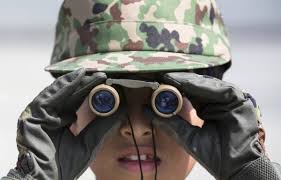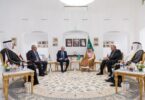Jio Kamata
Japanese postwar pacifism reached its pinnacle in 1976. That year, Prime Minister Takeo Miki adopted two measures representing the tide of the moment: a cap on the annual defense budget equal to 1% of gross national product, and a de facto ban on arms exports applying to allies and enemies alike.
For a long time, both policies were considered a national credo and were embraced fully, with pride, by major politicians. This sense of pride was reflected in remarks the same year as Miki’s reforms by Foreign Minister Kiichi Miyazawa, then considered a mainstream conservative: “We should be reluctant to consider whether or not our country will participate in (arms sales). Even if we can earn some foreign currency surplus, our country has not come to ruin so far as to make money by exporting weapons, and we should continue to do so as a country with higher ideals.”
Reflecting on Miyazawa’s comments, one could see hubris in implicating nations that export arms as being in “ruin” and holding lesser ideals. However, for people like the foreign minister, who experienced war during their formative years, it was a moral imperative to resist a slippery slope that might lead to the revival of militarism in some shape or form. Also, Japanese policymakers at the time believed that focusing their attention on economic development, rather than military affairs, was the best course of action.
Miyazawa passed away 17 years ago, but it would be interesting to hear his view on how Prime Minister Fumio Kishida – his distant relative and successor to the diplomat’s now-defunct faction – has altered the policies Miyazawa’s generation held dear. Almost all the defense budgets that Kishida has passed have exceeded the 1% cap and his government aims for defense spending to reach 2% of gross domestic product. Furthermore, the incumbent wants to further loosen restrictions on arms exports, which his critics argue would propel Japan into becoming a “merchant of death.”
A precedent was set last year when the government for the first time opened the path for Japan to export lethal arms to countries from which it acquires licensing permits – with the view that such a revision was needed to assist the United States’ ongoing effort to arm Ukraine.
To help backfill Ukraine’s depleting missile stock, Japan announced it would provide Patriot missiles to the US – missiles manufactured in Japan based on the permission of American manufacturers. That, in theory, would allow Washington to continue supporting Ukraine while maintaining enough missile stock to contend with other crises.
Recently, opposition in Japan spiked when the possibility of another exception to the lethal arms embargo emerged. The ruling Liberal Democratic Party wanted to pave the way for a forthcoming next-generation fighter jet – a joint project undertaken by Japan with Italy and the United Kingdom – to be exported to nations that are not involved in the manufacturing process. Just a few weeks ago, Komeito, the LDP’s junior coalition partner, opposed the change – then flipped its position once Kishida clarified his stance.
The prime minister emphasized that approval of arms exports to third countries would only apply to fighter jets – and even then these would only be exported to noncombatant nations. Also, Kishida emphasized that any decision on whether to export fighter jets should be approved unanimously by the Cabinet.
Komeito leaders described Kishida’s explanation as “valid,” “clear and detailed,” and on March 15 agreed with the LDP to greenlight the third-party export of fighter jets. On its website, Komeito highlighted the need to allow such exports to advance the codevelopment of fighter jets and reiterated that the policy change was a matter of “national interest.” On Tuesday last week, Kishida sanctioned a Cabinet decision making the measure an official policy.
In an interview with Jiji, Tomoko Tamura, the newly elected head of the Japanese Communist Party, quoted Miyazawa’s comments from decades ago and criticized Kishida by saying that he is pushing Japan into “ruin.” However, Japanese pacifists who quote Miyazawa liberally ignore his “realist” side, which they might not have fully come to terms with. Miyazawa was a pacifist in the sense that he insisted Japan should refrain from involving itself in war by sending troops and weapons abroad. Nevertheless, he did not ignore the need to adopt adequate measures to defend his country if faced with immediate danger.
In the 1990s, as regional tensions began to rise along Cold War lines – particularly the Korean Peninsula’s 38th parallel and the Taiwan Strait – the worldview of Miyazawa, who was prime minister from 1991 to 1993, transformed.
Foreseeing the ramifications of China’s early steps to becoming an economic and military giant as well as North Korea’s missile capability development, Miyazawa veered toward stances that would later align with those of late former Prime Minister Shinzo Abe – not generally remembered as a pacifist. For example, when Miyazawa was invited in 2001 to speak at an event marking the 50th anniversary of the San Francisco Peace Conference, he stressed the need to broaden the constitutional interpretation prohibiting Tokyo from collaborating with the American military absent a direct threat to Japan’s security.
At the time, the government viewed Japan as possessing the right to individual self-defense – to protect itself on its own behalf – but could not exercise collective self-defense that involved military action with a close ally without Japan being directly under attack.
Miyazawa proposed that Japan “recognize the right of collective self-defense as an extension of the right of individual self-defense,” which would allow Tokyo to undertake operations to defend the US military without legal obstacles. And this was the exact line of thinking that Abe took when he reinterpreted the Constitution in 2014 to authorize the “limited” exercise of collective self-defense, which would only allow Japan to join forces with foreign militaries when its survival is at stake. Although Miyazawa might have opposed Abe’s means, which revised the interpretation merely by the Cabinet’s will, he would not have disagreed with Abe’s intent – to maximize security by expanding the definition of self-defense.
Japanese pacifism is reaching a turning point after the greenlighting of exports of next-generation fighter jets. For people who quote Miyazawa’s 1976 comments on arms exports, the government’s decision crosses a moral Rubicon. Given that the public is almost evenly divided on the issue, there is a reluctance to embark into the uncharted territory of lethal weapons exports. However, what is also true is that Japanese people are increasingly coming to realize that they are living in an unsettled region and to understand the need to step things up for their own safety. Albeit with deep hesitation, the country is beginning to reconfigure the meaning of pacifism, just as Miyazawa did.
The Japan Times







